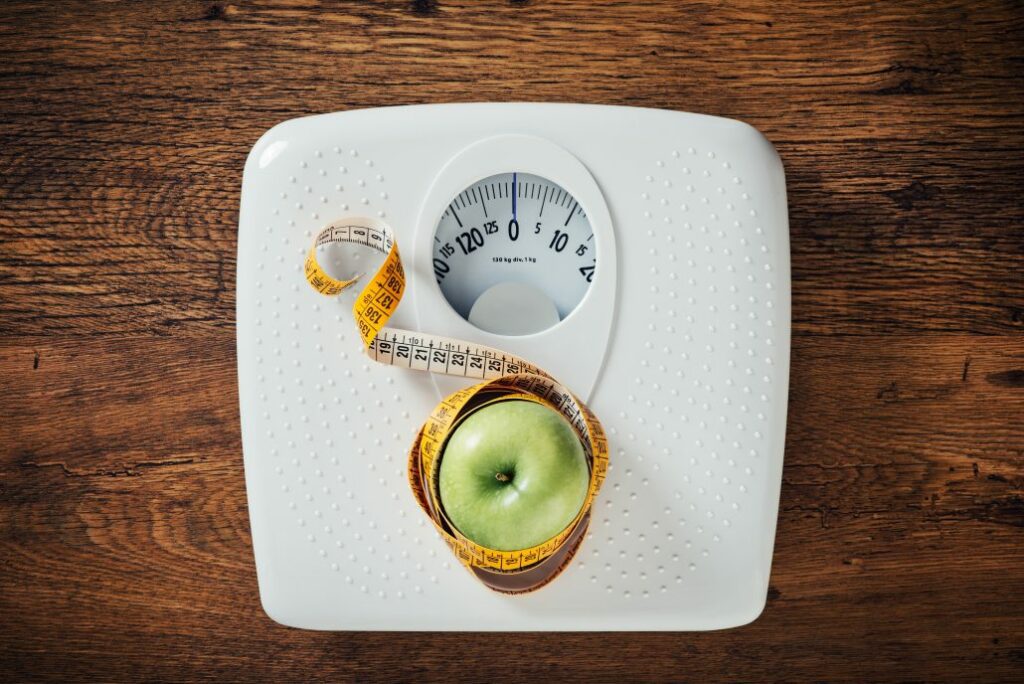Eating during OMAD Fasting | Is OMAD Good for Health | Are there any Risks with the OMAD diet | OMAD Diet Weight Loss | OMAD Fasting Results | Who Should Avoid OMAD Fasting |
OMAD Weight Loss, what can I expect? Let’s discuss this! One meal a day type of fasting is believed to bring great results with weight loss. In this type of intermittent fasting, you eat one meal only for the day, and it is considered an extreme type of fasting. Many fitness influencers claim to have followed this diet and have shared some astonishing results.
About 3-4 pounds of weight reduction is indicated by the OMAD weight loss data after one week. With any other diet plan, one typically loses about 2 pounds of weight. In just one week, some obese individuals were able to lose roughly 5 pounds of body weight using the OMAD diet.
Individuals who have been on the OMAD diet for about six months have dropped up to 30+ pounds of body weight.
OMAD or One Meal A Day fasting is a type of intermittent fasting where you will fast for 23 hours at a stretch and eat a large meal only during your one-hour eating window.
Today we will discuss the effects of OMAD on weight loss, along with other concerns relating to OMAD in this article.
Eating during OMAD Fasting – OMAD Weight Loss

There is no fixed time to eat while OMAD Fasting, some people prefer eating their single meal in dinner while others prefer taking the breakfast or the lunch. It is generally recommended to eat after your most active time of the day. During the fasting window, you can consume sugar-free coffee, tea, or water or, in some cases, fruit to bear the hunger pangs.
People should include nutritious food in their diet while doing OMAD fasting to meet the body’s nutritional requirements during just one hour within the day. Eating lots of proteins, grains, legumes, fruits, and vegetables is generally recommended for a healthy diet.
Fasting or not, it is always better to avoid processed foods that are baked in sugar, white bread, fast food like pizzas and burgers, chips, and soda.
You are allowed to drink black coffee, herbal tea, and water when fasting between meals.
There is no calorie restriction in this type of intermittent fasting as the time limit already restricts the amount you eat. People who wish to lose weight try to have a low-calorie, keto, or low carb diet during the eating window.
However, a study indicates energy restriction or energy excess during eating restricts the full possible benefits of intermittent fasting, and maintaining an energy balance is essential while eating.
Is OMAD Good for Health?
The research related to the OMAD diet is sparse, but this eating plan has potential benefits. OMAD benefits include:
Fat Loss
Eating one meal a day results in fat loss due to the non-availability of glucose in the body for a long time. The body uses glucose by releasing hormones from its storage to produce energy. Time-Restricted feeding trials on humans have indicated 2-3% weight loss in 1 to 4 months due to glycogenolysis or glucose breakdown, gluconeogenesis modulations. As the body produces glucose from non-carbohydrate food items and fatty acid oxidation, you may experience fat loss.
Reduces Cardiovascular risk

Intermittent fasting reduces frequent insulin production in the body and thus prevents cardiovascular disease, such as coronary artery disease, from occurring due to high insulin resistance. Also, intermittent fasting improves lipid profile by increasing high-density lipoprotein (HDL), reducing low-density lipoprotein and triglycerides in the body. You may improve your insulin sensitivity as well.
Reduces Inflammation
Increased body adiposity leads to inflammation due to elevated C-reactive protein and decreased adiponectin hormone. The adiponectin hormone protects the body from insulin resistance. Thus, intermittent fasting protects the body against inflammation by decreasing adiposity through reduced calorie intake and reprogramming metabolism.
Controls Diabetes
Intermittent fasting also helps deal with diabetes as fasting periods give the body time to bring down glucose levels. Research shows a reduction of fasting sugar and body weight as intermittent fasting affects the release of the leptin hormone that regulates body weight and body fat.
Repairs Tissues
By reducing the concentration of cortisol or the stress hormone levels in the body, intermittent fasting helps repair body tissues.
To know more about OMAD fasting, read – One Meal A Day: All You Need To Know About OMAD Diet.

Are there any Risks with the OMAD diet?
OMAD comes with its own set of risks. So, you should think twice before adopting it for weight loss.
- Digestive issues- You may experience bloating and digestive discomfort due to excessive eating within a short interval of time. At times, you may not be able to eat the required amount of food as per your calorie requirement or suffer from constipation.
- Lack of nutrition- The body might not get the required amount of calories, along with the necessary vitamins, minerals, and protein requirements. It can lead to nutrition deficit, low energy, irritation, or muscle loss.
- Low sugar levels- Intermittent fasting can also lead to hypoglycemia in people with Type 2 diabetes who are already taking medicines to reduce blood glucose. It could further lead to anxiety, dizziness, pale skin, sweating, or fatigue.
- Increased blood pressure- According to a study, eating one meal in a day puts you at the risk of high blood pressure and increased LDL (Low-density lipoprotein) or bad cholesterol in the body. High blood pressure can lead to strokes, kidney, or other heart-related problems.
- May lead to eating disorders- In some cases, the OMAD diet results in binge eating problems when not followed strictly. People who give up on this plan might end up eating a large amount of food in less time due to the constant feeling of anorexia. It could be because of an increase in ghrelin or the hunger hormone due to the prolonged duration of fasting.
Proper planning of your meals can help you avoid risks associated with OMAD fasting. If you need help in planning your OMAD meals read – 10 Tips On How To Plan Your OMAD Meals.
OMAD Weight Loss Diet

The theory of OMAD revolves around calorie deficit like most types of intermittent fasting. There is no specific evidence that OMAD fasting is more effective than other forms of calorie deficit diets.
An alternative to OMAD could be reducing calorie intake and following less restrictive types of intermittent fasting. It can help you reduce the harmful effects of this extreme form of intermittent fasting and achieve similar weight-loss results.
However, people keen to lose weight have benefitted by following the OMAD diet plan and experienced great monthly or even 1-week OMAD results.
OMAD Fasting Results – OMAD Weight Loss expectations
The OMAD weight loss results 1 week indicate around pound of weight loss. An average weight loss from any other diet plan is around 1 kg on average. Some obese people have also lost about 7 pounds of their body weight in their OMAD diet results of 1 week.
People who have followed OMAD diet for around half a year have lost up to 33 pounds their body weight.
Following OMAD for weight loss should be done with utmost care. Some people follow a ketogenic diet with OMAD to lose even more weight. It means including low carb, high fat, and a moderate amount of protein in your diet.
Issues such as a headache while fasting arises due to electrolyte imbalance. You can mix salt with water and drink to maintain electrolyte balance. Also, staying busy is important so that the mind does not keep thinking about food.
Practicing discipline while following an OMAD diet is essential to avoid binge eating. People who have adopted the OMAD diet for a long time also report improvement in their cognitive ability and concentration levels.

Who Should Avoid OMAD Fasting?
Breastfeeding females should certainly avoid OMAD fasting. Similarly, pregnant females and children below 18 years of age need a lot of energy and should avoid the OMAD diet.
Adults who already have an eating disorder or gastrointestinal issues are also advised against this form of intermittent fasting. Also, people consuming medications such as allopurinol, aspirin, non-steroidal anti-inflammatory drugs (NSAIDs), or steroids that are to be consumed with food should not choose this technique for weight loss. Again, diabetic patients need balanced meals, and no form of OMAD plan helps achieve stable blood sugar levels.
If you do not fall in any of the above categories and decide to pick up the OMAD diet, you can probably start with other simpler forms of intermittent fasting and gradually move to OMAD.
Results after 1 month – data we collected:

I personally lost nearly 8 pounds in 1 month trucking OMAD – and it was really with little to no changes in my diet or exercise routine. The only thing you have to overcome is that morning hunger, then once your body adjusts, you really don’t feel that hungry anymore. It’s mind over matter once you start, then its quite easy! And, it fits into ANY schedule spending less time prepping and cooking meals.
Whichever diet plan you choose, listening to your body and understanding what works best is always good to carry it religiously and achieve positive results. OMAD or One Meal a Day can provide amazing benefits and give your gut lots of time to heal. When paired with good food and exercise, weight loss can come swiftly and you can see results as soon as week 1!
Always be sure to consume healthy fats with any intermittent fasting diets. The health benefits are HUGE and can change your life fairly quickly. Fish oils, Olive oil, avocado and lean proteins are great choices. Be sure to eat enough calories by tracking your daily calories, make sure you are eating enough calories, and be sure to workout regularly to maintin your muscle mass, and overall well-being.
Creating fasting habits along with healthy foods as a regular practice is more important than taking intermittent fasting as a one-time thing. You should always try to stop indulging in unwatchful eating at other times.
The diet plan you choose should fit with your lifestyle; otherwise, it becomes difficult to sustain or carry it for an extended period of time.
Want to try OMAD for 21-days? Take up our 21-day One Meal A Day challenge











